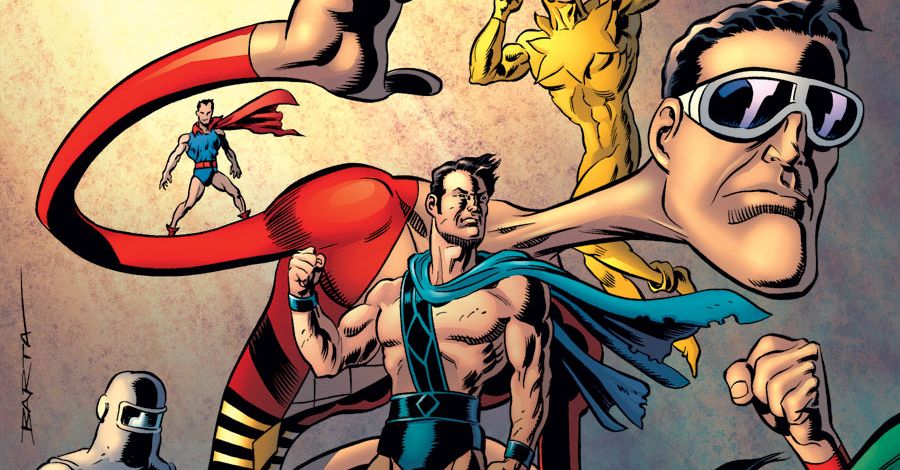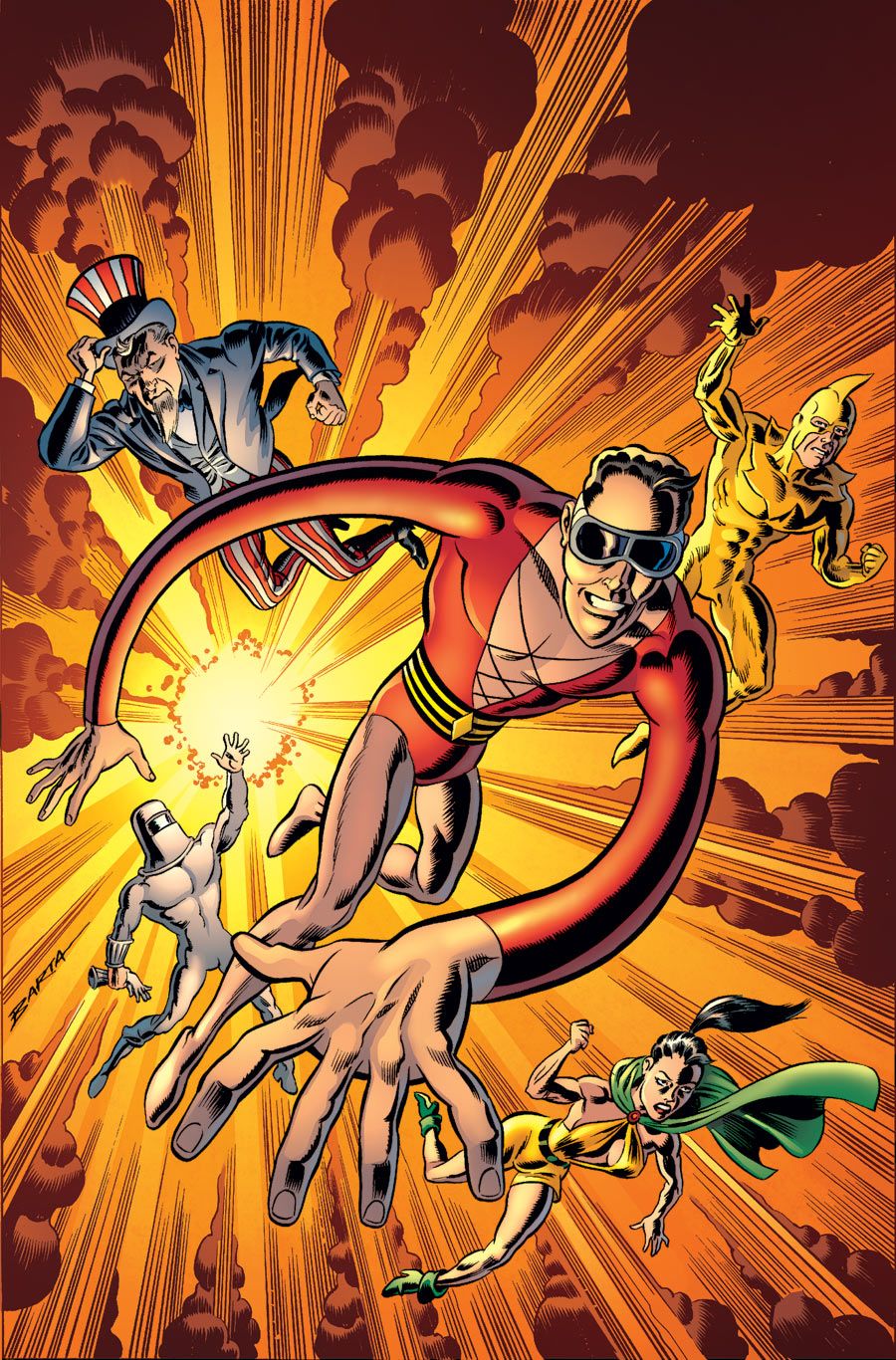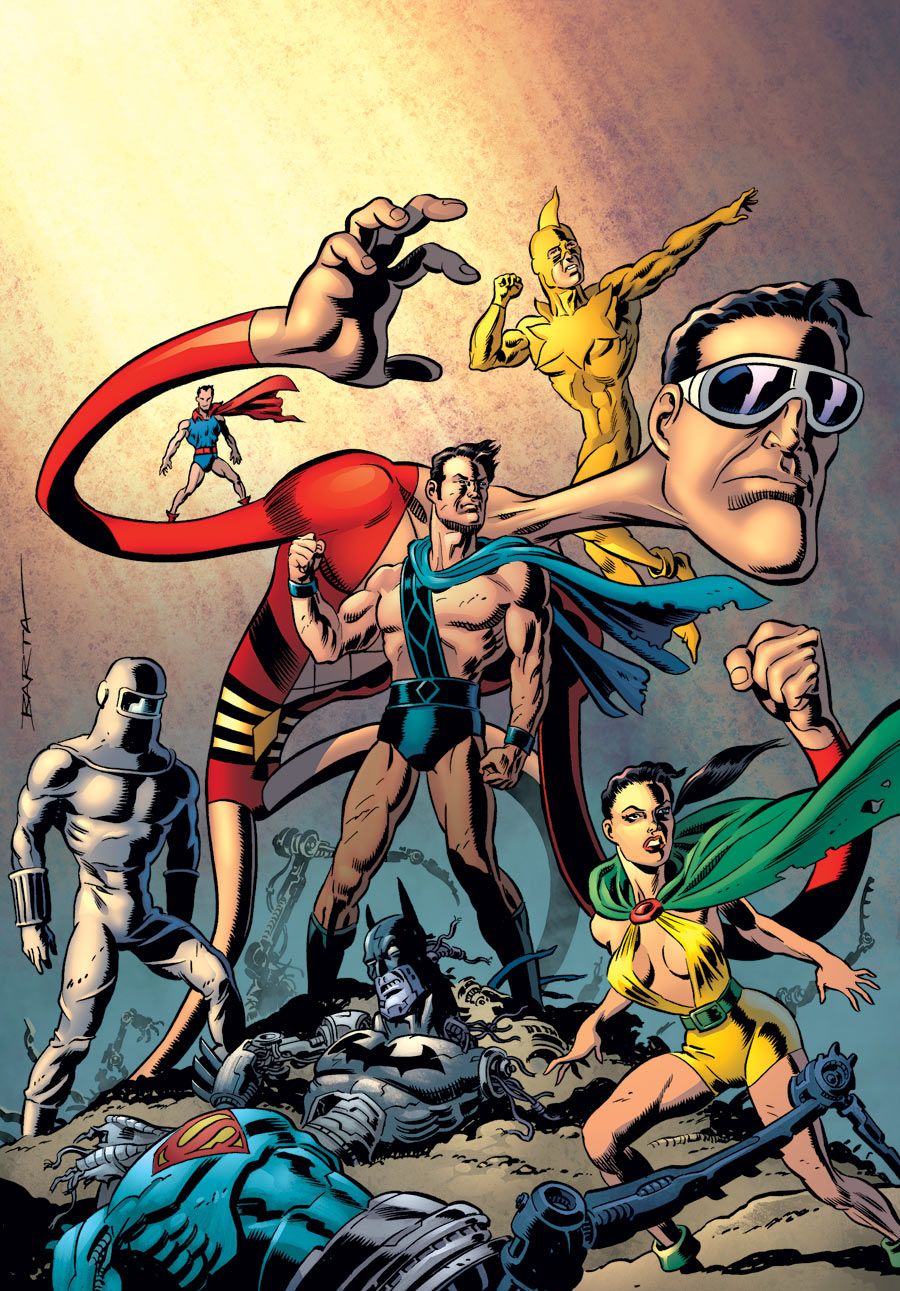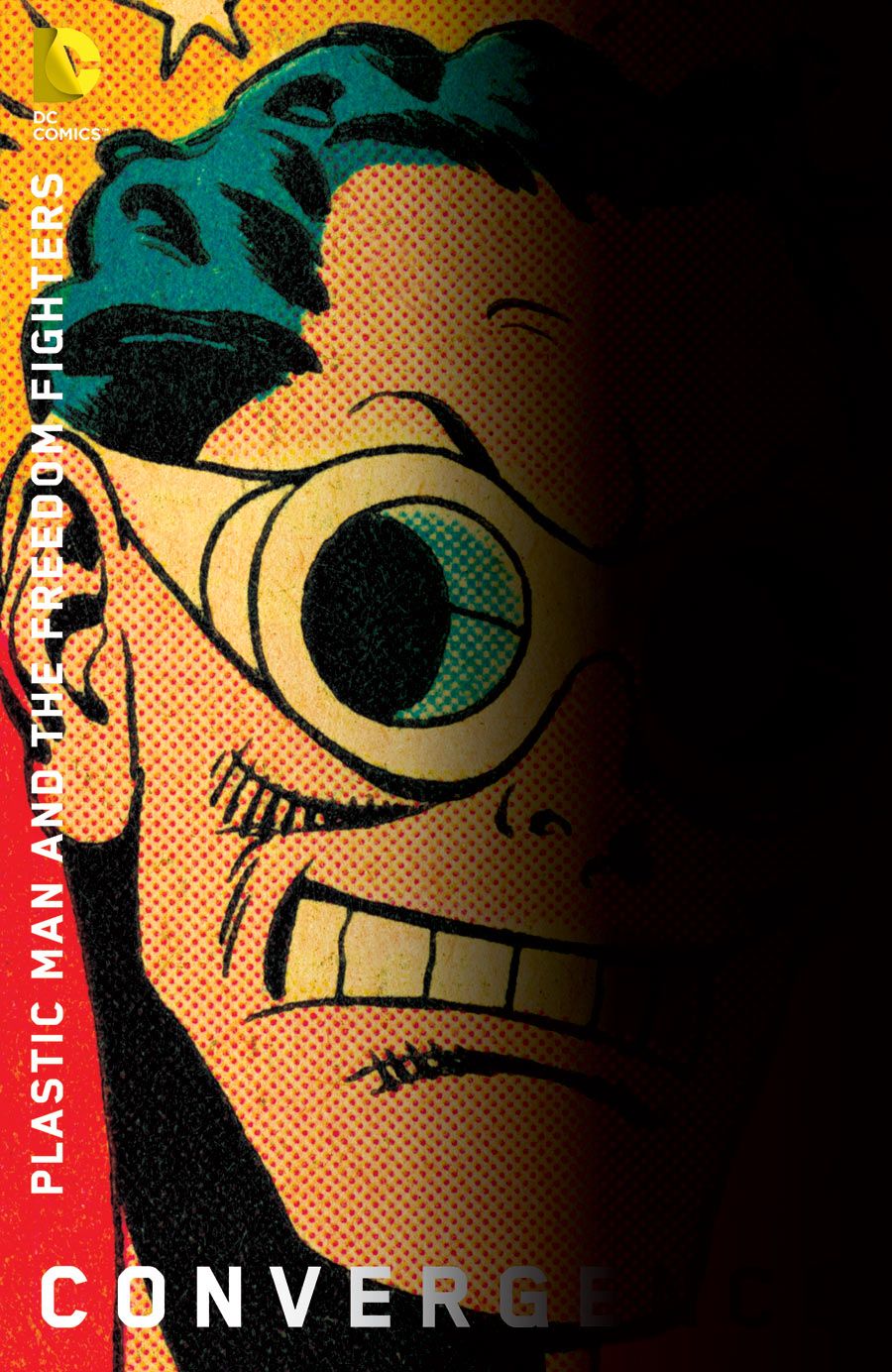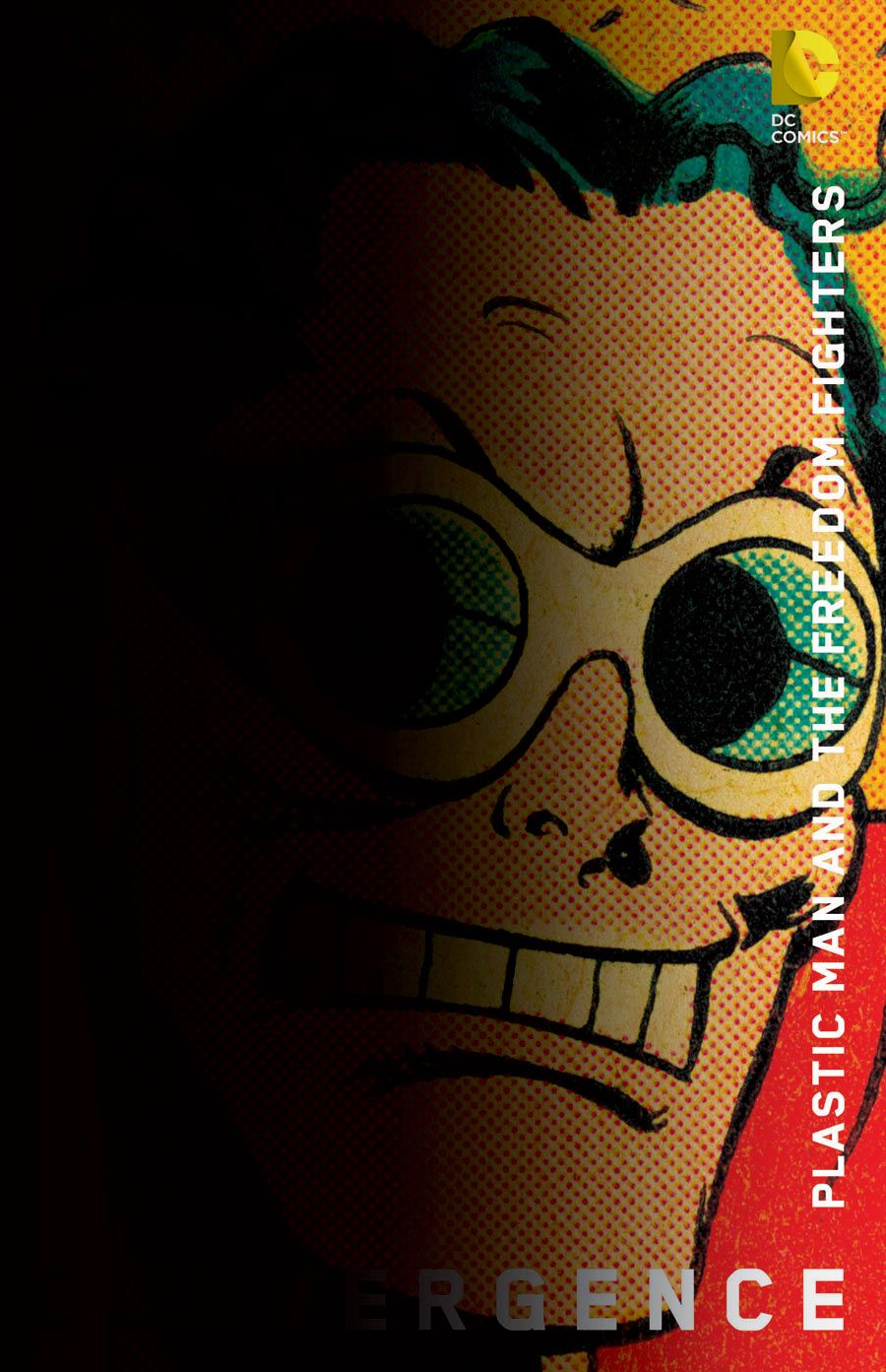When DC Comics Co-Publisher Dan DiDio started listing available characters and concepts to explore for the company's upcoming "Convergence" event, British-born writer Simon Oliver stretched out his arms when he heard "Nazis in occupied New York City and robot superheroes" and seized the opportunity to write "Convergence: Plastic Man and the Freedom Fighters." The two-part series, illustrated by Oliver's friend and fellow Brit John McCrea, features characters from 1985's landmark "Crisis on Infinite Earths" story and follows the exploits of Plastic Man and the Freedom Fighters as they fight for a New York City under siege by Nazis -- and that's just the half of it. Robot super heroes from the recent "Futures End" storyline also attack in the storyline, causing enemies to quickly become allies.
EXCLUSIVE: Bolland's Plastic Man Baffles Swamp Thing on "Convergence" Variant
To find out more about the new Plastic Man and Freedom Fighters team-up, CBR News connected with Oliver, a writer primarily known for his work on the Vertigo title "FBP: Federal Bureau of Physics." In the in-depth conversation, Oliver reveals the lineup of Freedom Fighters featured in the story, discusses how Plastic Man's criminal past definitely plays into the story, and addresses long unanswered questions surrounding the elastic hero's creation.
CBR News: Created by the legendary Jack Cole way back in 1941, Plastic Man has a long history of being played for laughs. What's your take on Eel O'Brian and will there be room for humor in "Convergence: Plastic Man and the Freedom Fighters"?
Simon Oliver: Yeah, of course. I knew at least a little about Plastic Man going in. I tried to read everything I could, but then as a writer you're faced with pulling off a balancing act; you want to make a character kind of your own in some ways, find that thing you connect with, but all the while not throw away or lose what it is that attracts people to the character in the first place.
In everything I read I liked Plastic Man's humor, but at the same time felt like he was falling too hard into comic relief. I wanted to kind of pull him back from that and get him to a place where he was reflecting on who he was, who he'd become as a superhero and have him try and figure out who he wanted to be going forward. He's still got a sense of humor -- and there are a few laughs in the book -- but I really hope readers will find and connect with a more mediative, more rounded version of the character.
Are Plastic Man and the Freedom Fighters self-aware that "Convergence" is happening?
Yeah, once again there's things I can't get into, but they know something is happening. They know that they're going to be fighting -- and that's really all I can say.
How does "Convergence: Plastic Man and the Freedom Fighters" tie into the other "Convergence" titles, including the main series written by Scott Lobdell and Jeff King?
I know only about what in technical terms would be termed a 'smidge' more than you do. Dan pitched me the overall story at Comic-Con last year, how with the move to the West Coast, it would be this pretty great way to touch on DCU's history and revisit old characters and worlds along the way. But I haven't read the main series. Mine is a small offshoot of something much, much larger.
Oliver Makes Weird Science in "FBP: Federal Bureau of Physics"
The two-part series itself features characters and, one would assume, plot threads from the epic "Crisis on Infinite Earths." Do readers need to go back and re-read that series before diving into this one and did you yourself go back and read it?
No, they should be fine. I think 95 percent of my story is pretty much self-contained. I was simply told to write a kick-ass, character-driven two-parter and above all, have fun -- and that's what I did, at least the "fun" part. It was no pressure and I had a blast.
Fighting alongside Plastic Man are the Freedom Fighters. Can you tell us about the members of the team and how they interact with each other and, more importantly, how they interact with Plastic Man?
Yeah, it's tough because there's a lot I can't get into because there's certain big picture stuff that I can't mention. But there's Phantom Lady, Human Bomb, Condor, Doll Man, The Ray, Uncle Sam and, of course, the Silver Ghost. And the Nazis are the bad guys, but then we have the robot superheroes in there, as well. Let's just say it's a lot for a two-parter. It moves fast, zero pages of guys in rooms talking. [Laughs]
Come to think of it, superheroes fighting robots and Nazis in New York City does sound like a Simon Oliver book. With Doctor Dome and Murray "the Swede" Schneiderman, Plastic Man has battled a wide range of supervillains and low level rogues over the years. Are we going to see him come face to face with the ultimate supervillain, Adolf Hitler, in this series?
I so wished I could have done that. In fact, my first story outlines were deemed "too much Nazi, not enough superhero." But back when Dan [DiDio] ran through potential titles on the phone, I honestly didn't listen past "Nazis in occupied New York City and robot superheroes." I was like, "Back up. What the fuck was that again? Oh, I think I can do that."
I think growing up when I did in England, when we still played in old concrete pill-boxes and people still had the remains of air raid shelters in their gardens, you develop a strange, borderline unhealthy connection with the second World War.
This is your first chance at writing a superhero comic book for DC Comics. Superman and Batman have been written by hundreds of writers over the years but Plastic Man -- despite being just two years younger than those company icons-- has far less continuity to contend with. What intrigues you about the character and what makes his power set advantageous to explore?
Yeah tell me about it, I was super scared getting into the DCU because of the massive continuity, period, but in the end was saved by Plastic Man having a lot less continuity to keep track of. There were a few unanswered and confusing elements that came up; [a] big one was [that] at some point he was killed and kind of just came back -- then again, can you kill someone who can't bio-degrade?
But once I got past those restraints and my own unfounded fear, it was like any story, and any character, superhero or not. You just have to find what makes him tick. I really got into this idea of his petty low-life criminal past. It seemed like a pretty big rock he'd been dragging around.
It's super cool that you have John McCrea on art for this project. Were you familiar with his work before this collaboration? What does he bring to a project?
John kicks ass. I have a page from the book taped above my desk right now, because every time I look at it, it blows my mind. While John was drawing it -- he's in England and I'm out in California -- because of the time difference he'd be e-mailing in his day's page when I'd be waking up, which, I can tell you, is a great way to start the day.
There are a lot of good artists out there. A good artist can draw what you've written, but a great artist, like John, can take that script and really add to it -- even if it's small touches, ideas about layout, facial expressions, stuff that too often goes unsaid, but really build on the foundation of what the writer has done. I've always been pretty lucky with artists.
Now that you have had a taste of writing superhero comics, would you like to write more Plastic Man or are there other DC superheroes that you would like to explore?
I don't know. It was a pretty great experience, and now that I've done it I'd definitely like to do more. I kind of fell for Plastic Man pretty hard and would love to expand on what I started with him. It was just two issues, and we tackled a lot of story and emotion in that, but I think his character has some room to grow and go places on those bendy legs. But yeah, I'd be open to take a look at pretty much anyone now.
"Convergence: Plastic Man and the Freedom Fighters" #1 by Simon Oliver and John McCrea is slated for release April 29.

